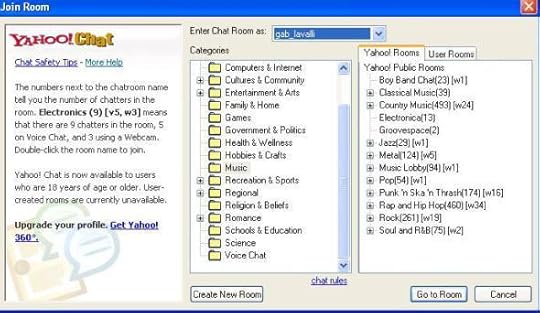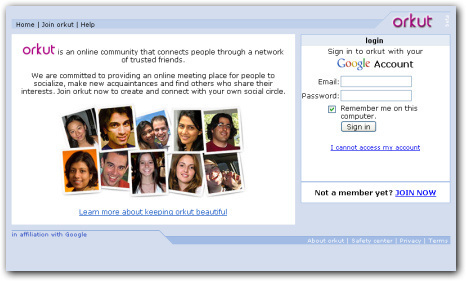Goodbye Yahoo ! Chat. Goodbye Orkut.
Once upon a time, there was no high-speed Internet, the mention of the word apple still conjured up images of a fruit, the forward-thinking Xerox-“STD” stores charged one rate for domestic email and another for international email, Pagerank was still in “What the eff is that?” phase, intellectuals did not have the luxury of appearing erudite by reading Wikipedia just-in-time-for-an-argument, and research was still done in libraries—you know the ones where they keep hard-copy ebooks.
And Yahoo! was Salman Khan, the 100-crore giant in the room. It was your browser home-page, the post-box where you got your email (there were so few that you even read the spam) and the search box where you typed in “Cindy Crawford sexy pictures”. Sure, some people used Hotmail too, perhaps under the mistaken impression that the mail you would get there would be of the hot type, but still Yahoo ! was the most popular online destination. It was whispered that the people behind Yahoo! were Shammi Kapoor fans, but since there was no Wikipedia then, we could never confirm if this was true. But we assumed it was.
It was around this time that many started discovering this other Yahoo! feature.
Yahoo Chat. Or simply the ! in Yahoo !
I mean, Desibaba was all well and good, but there is only so much that morphed pictures of Karishma Kapoor and stories of the “Bhabhi ki kharabi” series can do for a hot-blooded individual. One then desired the company of a real person of the opposite gender, and so the thirsty generation waited, till the night fell and parents fell asleep, to fire up their dial-up modems, the whrrrrr hunting tone making them throb with the anticipation of the hunt, as they quietly dove into the world of Yahoo! Chat rooms.
20’s Love. 30s Love. Adult-themed chatrooms that only one’s friends visited.
Clicking on ids, initiating contact(virtual), waiting for replies, and then if Houston made contact, to proceed with the opening move that came to be known as a/s/l (Age/sex/location).
Frequent denizens of Yahoo Chat, and I can only speak from the male perspective, knew the rules. Rule number 2 was that angelgirl123 and bustylusty4u and similarly provocative ids were all bots, who wanted you to click on links. Rule number 3 was that one could use Salman Khan’s picture as your own only when chatting in UK and US rooms. And rule number 1 was that any female-sounding id who initiated chat contact with a male id was either as a bot or a jealous girl-friend under another name trying to validate her man’s honesty or, this was most common, a man. For some reason I could rarely fathom, a large number of men would chat as women in Yahoo ! Perhaps they wanted to experience the sensation of being wanted, a sensation many used to a life of lonely desperation never quite experienced. Perhaps they suffered from the prison syndrome, where you no longer care if it is a man or a woman. Whatever may have been the real reason, the things to remember was that if something was too good to be true, it definitely was. The ultimate confirmation of the gender of the finger at the other end of the chat-line would obviously be a voice chat (and one cultivated an ear to distinguish genuine women from desperate men doing their best Lata Mangeskar impression) and the holy grail, video chat. But with the speed of dial-ups being as they were and that blood was cheaper than megabytes of bandwidth and most importantly women never did cam-chat unless she was speaking to a man with whom she already had two children, the chance of visual affirmation was about as much as that of Venkatapathy Raju winning a Mr. Universe bodybuilding competition.
And hence they all groped along in the darkness. Literally and cyberly.
Yahoo! Chat was not just about making connections in the great beyond. It fuelled the economy, building, together with gaming and porn, the cybercafe business in India. College kids and yes even school kids would come to cybercafes, in groups, and huddle over one Pentium machine, giggling and nudging each other, bags placed strategically on laps. As chat rooms became voice-enabled, communities started to build around Chat rooms, with people fighting for the mic, some singing, some emitting sounds of doubtful provenance, and some shouting random abuse in colorful language for no good reason.
It was organic, it was funny, it was fun, and yes, once in a while, people did find that perfect match.
But then Yahoo!, the company itself began to die under the onslaught of Google. Before we knew it, Yahoo! Chat had become like Sealdah station , not maintained, left to rot and with suspicious people hanging about, looking here and there.
The people had to be somewhere of course. So they began flocking to the next big thing, social networking. The age of anonymity and multiple identities had come to an end, to be replaced by a more conventional interaction ethic that more resembled the real world’s.
Orkut, with its profile pictures and real names, was considered more trustworthy than the wild wild west of Yahoo!, despite the profusion of profiles with Ayesha Takia pictures. Hence it flourished.
A new vocabulary came into being. Friending. Unfriending. Blocking. Scrapping. Testimonials, the politics of which would have overwhelmed even Machiavelli.
With picture albums that were open for public viewing initially, one could spend rainy afternoons surfing through real pictures of women, and then, send them scraps asking for “fransip” with the goal being to evolve the “fransip” into “labhsip”. Sure the English was bad, and ppl missed vowels and used caps and small letters indiscriminately, and neologisms like “hottings” and “nottings” (the latter being considered a portmanteau of “naughty things”) were indiscriminately coined, but one could not mistake the genuine bonhomie and desire to connect across boundaries of space and time, and no where was this better expressed than in the albums of pretty women who would wake up in the morning to find scraps left by total strangers of the type “Nice lag. Will u mekk fransip wid me?”
But then somewhere down the line, Facebook opened itself to the world, with its better user interface and its locked down albums. People started fleeing Orkut faster than industries from Bengal, and Orkut, once dutifully maintained and updated, became like a ghost post-apocalyptic cityscape, there and yet not there,
Not that Orkut could not have been saved. Not that Yahoo! Chat could not have been saved. It was that its owners never figured out how to commercialize them.
The golden age of the Net was now officially over. Things no longer existed for the sheer pleasure of being there. Power had passed from the hands of engineers and scientists and intellectual adventurers to the MBA types. Yahoo! Chat was too anonymous to monetize through targeted advertisements. Orkut was better in that respect but it had not been designed from the beginning keeping in mind a commercial strategy, and the cost of re-architecting it was considered too prohibitive.
So Google built the Orkut replacement Google+, the Rohit Sharma of social networks, supposedly very awesome but no one knows what its good for. Facebook though won as the social network war, evil and omnipresent, monitoring and mining every thing you do. What used to be innocent questions like “What are you wearing?” during Yahoo! Chat days are now commerce-driven information processing queries, with Facebook knowing not only what you are wearing now but also what you will wear tomorrow, and here is an advertisement for you from one of our partners to stock up your wardrobe, and even after you leave Facebook, they pursue you in your other tabs, like a won’t-take-no-for-an-answer pimp.
So today we pine. Today we weep. For Yahoo! Chat and Orkut no doubt, but more than them, for those kinder, simpler times, when corporations did not know what we got off to, when people were users, and not assets that drive stock valuations.
And so it will come to pass. The servers will be redeployed. The landing page will become a static headstone. The lights will be turned off for good.
Yet the two shall remain, in our memories, in hours of lost productivity, in seconds of strategic screen-minimizations,in floating scraps of conversations and in shards of indescribable delight.
Goodbye old friends. Sail gently into the night.







